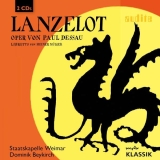Paul Dessaus Oper Lanzelot wurde im Dezember 1969 an der Deutschen Staatsoper Berlin uraufgeführt. Das Libretto von Heiner Müller und Ginka Tscholakowa beruht auf dem Märchenstück Der Drache von Jewgeni Schwarz.
In der Programmnotiz heißt es: « Die Parabel Der Drache wurde 1943 vor dem Hintergrund des Naziterrors geschrieben und war wegen der allzu deutlichen Kritik am totalitären Regime Stalins in der Sowjetunion zunächst 17 Jahre lang verboten. 1965 brachte Benno Besson das Stück über den Drachentöter in einer legendären Inszenierung am Deutschen Theater in Berlin heraus. Dessau entdeckte darin eine operntaugliche Vorlage mit den für ihn so wichtigen gesellschaftspolitischen Bezügen: Ein freier Held möchte die Drachenstadt von seinem inhumanen Usurpator befreien, doch er stößt auf Desinteresse bei den Stadtoberen und der Bevölkerung, die sich arrangiert hat. Die Gleichgültigkeit schlägt in Feindseligkeit um, als Lanzelot den Drachen besiegt. Die offene Diktatur des Drachen wird umgemünzt in eine verdeckte Ausbeutung der Bevölkerung, in eine Herrschaft weniger über viele. »
Die Musik ist prägnant, farbig, oft schlagkräftig, aber manchmal auch sehr lyrisch, grotesk und real, mit Anklängen an Barockmusik, Beat-, und Mozart sowie Zitaten von Chopin, Rossini und Wagner.
Das Werk wurde im November 2019 am Deutschen Nationaltheater Weimar unter der Regie von Peter Konwitschny und der musikalischen Leitung von Dominik Beykirch erneut aufgeführt. Der Dirigent gibt Dessaus abwechslungsreicher Musik eine große Vitalität und lässt sie über die interessante und immer noch aktuelle Handlung hinaus rein musikalisch höchst attraktiv werden.
Unter den Solisten fallen Emily Hindrichs als Elsa und Mate Solyom-Nagy als Lanzelot ebenso auf wie Oleksandr Pushniak als Drache und Wolfgang Schwaninger als Bürgermeister. Aber auch alle anderen Sänger lassen keine Wünsche offen.
Und weil der Hörer sich ohne Bühnenhandlung und Dekoration voll auf den Sound konzentrieren kann, kommt die Musik unwahrscheinlich gut zur Geltung und macht diese Audite-Veröffentlichung besonders wertvoll. Wer sich dennoch von der Bühne einen Eindruck verschaffen will, kann das anhand von zahlreichen Fotos im Booklet tun. Hervorragend ist auch der gut erklärende Einführungstext von Dominik Beykirch.
Paul Dessau’s opera Lanzelot was premiered in December 1969 at the Deutsche Staatsoper Berlin. The libretto by Heiner Müller and Ginka Cholakova is based on the fairy tale play Der Drache by Yevgeny Schwarz.
The program note says: « The parable Der Drache (The Dragon) was written in 1943 against the backdrop of Nazi terror and was initially banned for 17 years in the Soviet Union because of its overly explicit criticism of Stalin’s totalitarian regime. In 1965, Benno Besson staged the play about the dragon slayer in a legendary production at the Deutsches Theater in Berlin. Dessau discovered in it a template suitable for opera with the socio-political references that were so important to him: A free hero wants to free the dragon city from its inhumane usurper, but he encounters disinterest from the city’s superiors and the population, which has come to terms. Indifference turns to hostility when Lancelot defeats the dragon. The dragon’s overt dictatorship is transformed into a covert exploitation of the population, a rule of the few over the many. »
The music is concise, colorful, often punchy, but sometimes very lyrical, grotesque and real, with echoes of Baroque music, Beat, and Mozart, as well as quotations from Chopin, Rossini, and Wagner.
The work was performed again in November 2019 at the Deutsches Nationaltheater Weimar, directed by Peter Konwitschny and musically conducted by Dominik Beykirch. The conductor gives Dessau’s varied music great vitality and makes it highly attractive in purely musical terms, beyond the interesting and still topical plot.
Among the soloists, Emily Hindrichs as Elsa and Mate Solyom-Nagy as Lancelot stand out, as do Oleksandr Pushniak as the Dragon and Wolfgang Schwaninger as the Mayor. But also all other singers leave nothing to be desired.
And because the listener can fully concentrate on the sound without stage action and decoration, the music comes across incredibly well and makes this Audite release particularly valuable. If you still want to get an impression of the stage, you can do so with the help of numerous photos in the booklet. The well-explanatory introductory text by Dominik Beykirch is also excellent.
























